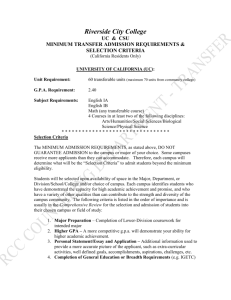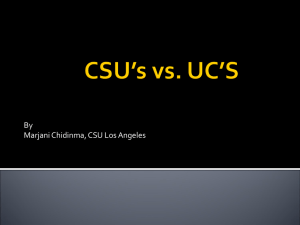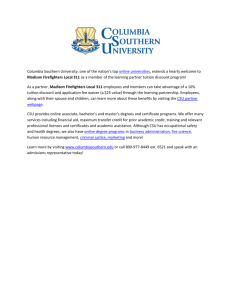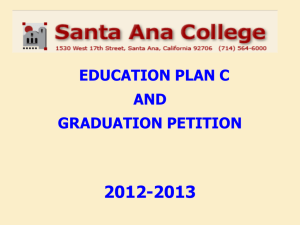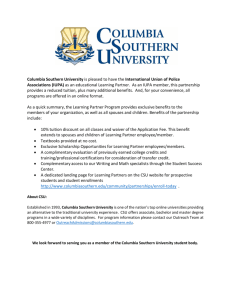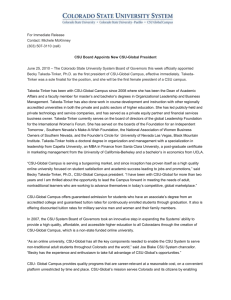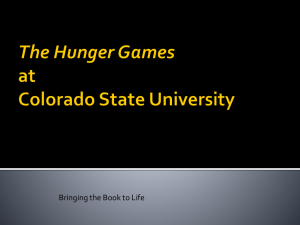Advising Students - Tips, Tools and Resources
advertisement
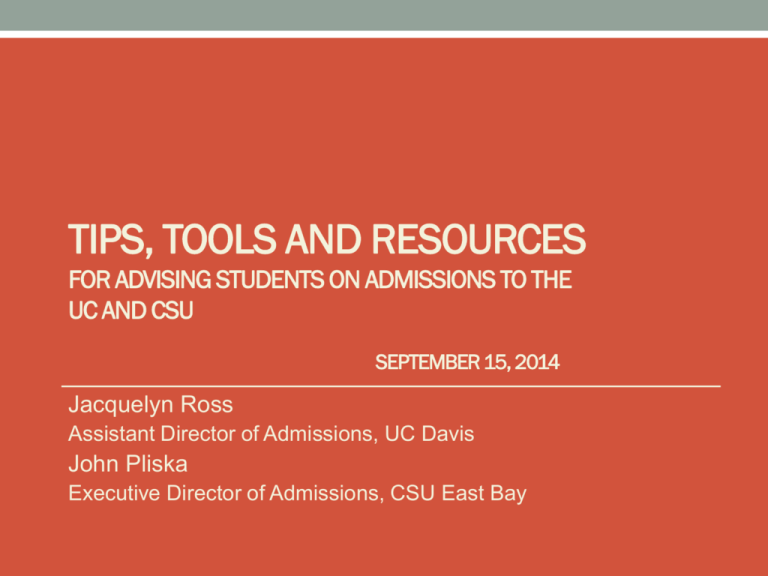
TIPS, TOOLS AND RESOURCES FOR ADVISING STUDENTS ON ADMISSIONS TO THE UC AND CSU SEPTEMBER 15, 2014 Jacquelyn Ross Assistant Director of Admissions, UC Davis John Pliska Executive Director of Admissions, CSU East Bay Goals and Organization of the Session Goals of the Session Organization of the Session • Share possible approaches • Before Junior Year: “It’s to advising students during high school. • Encourage counselors to explore the many available resources and tools by providing some examples. • Supporting High School Counselors is good for everyone. too early to think about college.” • Junior Year: “I can’t think about college because I have to take another exam.” • Senior Year: “Why didn’t I think about college?” • Summer Break: Ask questions. YOU ALREADY KNOW THE MOST IMPORTANT RESOURCE Our Most Important Resource: Each Other http://www.calstate.edu/sas/counselors-conferences.shtml http://admission.universityofcalifornia.edu/counselors/newsevents/conferences/ Share ideas. There are many right ways to advise students. BEFORE JUNIOR YEAR: WHAT ARE THE VERY FIRST QUESTIONS? A.) What college do I want to go to? What college should I go to? Should I go to a CSU, a UC, a Private School or Community College? B.) What do I want to major in? What should I major in? C.) Both of the Above D.) None of the Above D.) NONE OF THE ABOVE THE FIRST QUESTIONS: “What is college?” “What is a major?” “Where can I go to college?” “What can I major in?” Where can I go to college? Make it real. • Question: “Where can I go to college?” • “Can I even go to college?” • “Can I go to a UC or a CSU? How about a private school? California Community College?” • The long answer: all of the above • Make it Real: Explore some selected Campus Web sites. • Don’t forget to look at Campus Maps and Campus Photos. Resources: Where can I go to college? UC and CSU Overviews for Students http://start.universityofcalifornia.edu/ http://www.calstate.edu/college http://www.californiacolleges.edu/ More Tools for Counselors and Students: http://admission.universityofcalifornia.edu/counselors/ http://www.ucop.edu/education-partnerships/programs/resources-forpreparing-for-college.html http://www.calstate.edu/SAS/counselors.shtml “Can I Pay for College?” Financial Aid Overviews http://admission.universityofcalifornia.edu/paying-for-uc/ http://blogs.calstate.edu/college/index.php/students/paying-for-college/ http://admission.universityofcalifornia.edu/counselors/index.html http://www.calstate.edu/sas/counselors.shtml What can I major in? Make it real. • Question: “What can I major in?” • “I CAN major in that?!” • Where does this question STEM from? • Many students assume they are not capable of studying STEM Majors. • Example: “What is Construction Management?” • Construction Management may be a better option for some than Civil Engineering. There are other similar relationships between majors. • “I can major in THAT?!” • • • • Fire Protection Administration and Technology. Where? Global Disease Biology. Where? Psychology (Ergonomics and Human Factors Psychology). Where? Undeclared = Major in General Education with a plan to discover a major • Campus advising helps multi-interest students. • Make it real: spend time early looking at fields of study and specific majors. Resources: I can major in THAT? • UC and CSU System-wide degrees and majors: http://admission.universityofcalifornia.edu/counselors/resources/majors/ (Tip: Downloadable .pdf on this page.) http://degrees.calstate.edu/ (Tip: Under Area of Study, click View List and copy the list; then use that list to search). Spend time searching. Majors have a variety of different names. Examples: Kinesiology, Biomechanics, Physical Therapy • “I can take a CLASS in THAT?” • Make it real: links above direct to campus Web sites with lists of classes. JUNIOR YEAR: “I’M SERIOUS, NOW. WHAT KIND OF STUDENT AM I REALLY?” “(Oh, yeah I got a ‘D’ in Geometry and failed Spanish 2.)” A.) UC STUDENT B.) CSU STUDENT C.) COMMUNITY COLLEGE STUDENT D.) PRIVATE SCHOOL STUDENT E.) NONE OF THE ABOVE F.) ALL OF THE ABOVE G.) WE’RE SERIOUS, NOW, TOO: ALL OF THE ABOVE. G.) WE’RE SERIOUS, NOW, TOO: ALL OF THE ABOVE “A-G” is COLLEGE PREPARATION not APPLICATION PREPARATION The intent of the “a-g” subject requirements is to ensure that students have attained a body of general knowledge that will provide breadth and perspective to new, more advanced study. P.S.: Yes, we also use “a-g” when reviewing Freshmen applications. P.P.S.: But we don’t use “a-g” when reviewing Junior Transfer applications. JUNIOR YEAR: “WHERE CAN I GO TO COLLEGE?” Understand Admission Requirements Explore Campuses Junior year is the warm-up for senior year Three components of college admissions • Eligibility • Defined requirements • There are still some guarantees. • Level of Preparation • English & Math • Students with some deficiencies can succeed with support. • Selection • CSU Impaction • UC Holistic Review • Admission by Exception Resources: Understand Admissions General Resources (UC): http://admission.universityofcalifornia.edu/ http://admission.universityofcalifornia.edu/counselors/files/quickreference-2014.pdf General Resources (CSU): http://www.calstate.edu/apply/ http://www.calstate.edu/sas/documents/admissionhandbook.pdf Resources: Explore Campuses • Learn about UC campuses: • http://admission.universityofcalifornia.edu/campuses/index.html • Includes links to campus Web sites • Learn about CSU campuses (campus Web sites): • http://www.calstate.edu/search_find/campus.shtml • Learn about CSU campuses (admissions differences): • http://www.calstate.edu/sas/casper/index.shtml • California Colleges Web site: • http://www.californiacolleges.edu/ Junior year is the warm-up for senior year • 2nd big year for GPA calculated for admission. • Check A-G Requirements progress. • Plan senior year schedule. Make up any missing classes. • http://www.ucop.edu/education-partnerships/_files/Map-online.pdf • http://www.csumentor.edu/planning/ • http://www.californiacolleges.edu/High_School_Planning/_default.aspx • The big tests (SAT or ACT) • Optional tests: Subject Tests, Advanced Placement and International Baccalaureate • Preparation and college credit • Students should read, read, read. SENIOR YEAR: APPLY AND PREPARE “What school do I want to go to?” “What schools will I apply to?” Encourage students to keep a calendar. Senior year is the warm-up for freshmen year. APPLY EARLY AND BROADLY! The CSU Application really has two parts: CSU Application: https://www.csumentor.edu/ CSU Impaction: http://www.calstate.edu/sas/impactioninfo.shtml http://www.calstate.edu/sas/documents/CSULocalAdmission-ServiceAreas.pdf Take advantage of the unique eligibility guarantees: Students should apply to at least one campus and major that is not impacted (including campuses with local guarantees.) CSU Educational Opportunity Program (EOP) Application is separate: http://www.csumentor.edu/admissionapp/eop_apply.asp The UC Application: http://admission.universityofcalifornia.edu/how-to-apply/apply-online/ Housing applications procedures and deadlines vary by campus: Check campus housing web sites early. Finish the application process • Senioritis • Students should report course changes and grade drops (D’s and F’s) to every campus they have applied to. • Yes, SIR • Make sure students declare intents to register by the May 1st deadline. • Placement tests • CSU Entry Level Math (ELM) and English Placement Test (EPT) http://www.ets.org/csu/ • UC Tests • Encourage students to keep a tight calendar: • Examples: Transcript deadlines, Orientation Sign-up • “Read all e-mail you are sent.” SUMMER BREAK: FRESHMEN YEAR, AGAIN? Summer programs and requirements Exploring Campus Resources early is part of preparing for college. Summer Programs and Requirements • Check requirements for every campus being considered • Sign up for orientations • Is CSU Early Start Required? http://www.csusuccess.org/earlystart • “Read all the e-mail you are sent.” MORE THAN JUST TUTORING AND A LIBRARY! There are a wide range of campus and System-wide services, initiatives and organizations that support UC and CSU students on their path to graduation, both inside and outside of the classroom. Advise incoming students to explore campus and System Web sites for services even before they arrive on campus. Clubs and organizations and other Student Life Initiatives often support students outside the classroom, helping them succeed in the classroom. Example: CSU Affordable Learning Solutions • CSU’s Affordable Learning Solutions (ALS) enables faculty to choose and provide more affordable, quality educational content for their students. • By reducing CSU student course material expenses, more students acquire the course materials they need to succeed and benefit from their CSU learning experience. • Now, CSU faculty and students have greater access to quality free and low-cost learning materials through a variety of ALS programs and partnerships. http://als.csuprojects.org/ Example: CSU e-Advising Initiative • Advising and scheduling bottlenecks can impede the path to degree. Students often lack timely access to information and guidance as to courses available to meet their needs. Campus scheduling staff often may not have required information about students’ plans and courses needed. • As a result, campuses have been asked to focus on leveraging technology to improve advising services. http://courseredesign.csuprojects.org/wp/eadvising/ Example: UC Resources for Undocumented Students • Undocumented students of all ethnicities and nationalities can find a safe environment and supportive community at the University of California. There are various programs to help students transition to and succeed at UC. • UC campuses offer a range of support services — from academic and personal counseling to financial aid and legal advising. • Each campus has a student group, club or organization where students can find an encouraging peer network. http://undoc.universityofcalifornia.edu/ THERE ARE MANY RIGHT WAYS Questions Discussion
